Kevin Clarke
Operetta Research Center
31 March, 2020
When it comes to Naxos and operetta, and Johann Strauss shows in particular, the famous budget label has a rather mixed reputation. On the one hand there are historic treasures that document a standard in operetta performance long since lost (there’s the famous Schwarzkopf series, there’s a Nacht in Venedig from the Berlin radio from Nazi times, there are various albums with outstanding Strauss tracks, there are the equally famous Clemens Krauss recordings etc.); on the other hand the attempts to produce new recordings for a contemporary Strauss series have not been too successful. And the list is long. So when I first heard that there would be a new Blindekuh cast album from Sofia I was somewhat hesitant, especially because I didn’t know the piece and its music, fearing it might be one of those latter day attempts by Strauss to write a “serious” Spieloper.

The cover of the 2019 recording of “Blindekuh” on Naxos, conducted by Dario Salvi.
Well, to start with the positive aspects: the music is a total surprise and an amazing one as well. This Strauss show premiered in 1878 at Theater an der Wien and is very much in the style of his early operettas, which are close to Offenbach and filled with naughty twists and turns. (Like the famous 1874 Fledermaus.)
For the world premiere production Strauss had the notorious Hermine Meyerhoff as a “guest” and as his leading lady (instead of Marie Geistinger). She’d been one of Vienna’s Beautiful Helenas, too, and she’d been many other things as well. And she made quite an impression with her “piquant” costumes in Blindekuh on the critic of Die Presse.
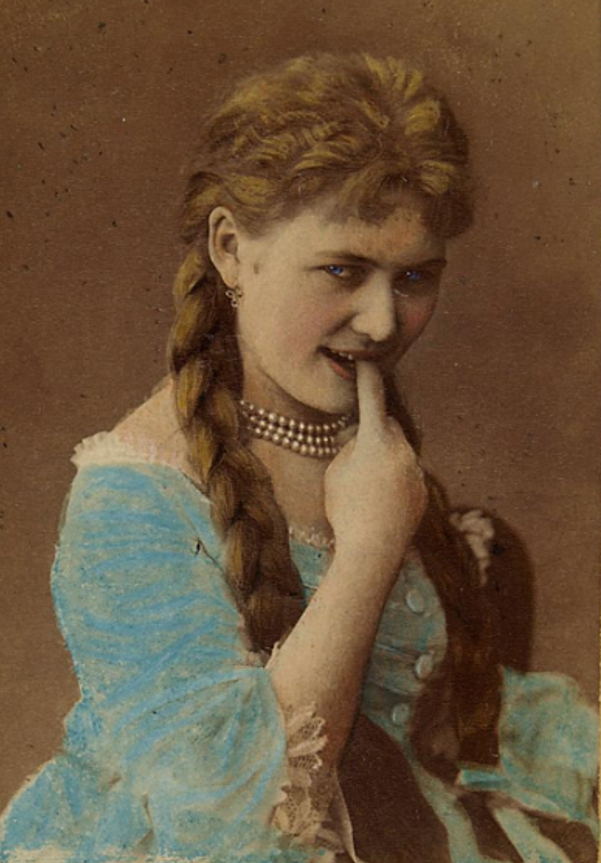
Hermine Meyerhoff in costume, sticking a naughty finger into her mouth. (Photo: Julius Gertinger / Theatermuseum Wien)
In his review we learn that the Strauss piece – about an impoverished young lady who is supposed to be married off to her rich cousin from the USA, against her will and against his will as well – owed its rapturous opening night reception first and foremost “to a string a couplets with all sorts of drastic effects, as well as a series of funny ensembles.” These were presented by an all-star cast “with animated enthusiasm” which made everyone seem “unusually lively” in the “sharply pointed” way they “sang and acted.”
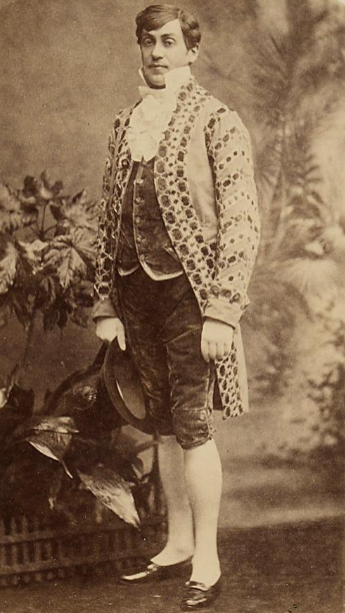
Alexander Girardi played many hillarious characters in his career, and often over-the-top servant. Here he’s seen in “Der Verschwender.” (Photo: Rudolf Krziwanek / Theatermuseum Wien)
Particular mention goes to Alexander Girardi as a silly house servant Johann (“dummpfiffiges Hausfactotum”) who gets to sing a ludicrous song about his “qualities” as a food connoisseur, rattling off pompous phrases in Latin and French in a screeching high tessitura, and imitating the chirping of a swallow later in the show with another stand-out solo.

The song in which Johann imitates a swallow in “Blindekuh.”
Also, Felix Schweighofer is singled out with an over-the-top song about the kind of woman he longs for (“A’ so a Weiberl, das wär’ meine Passion,” i.e. “Such a woman/wife would be my passion”).
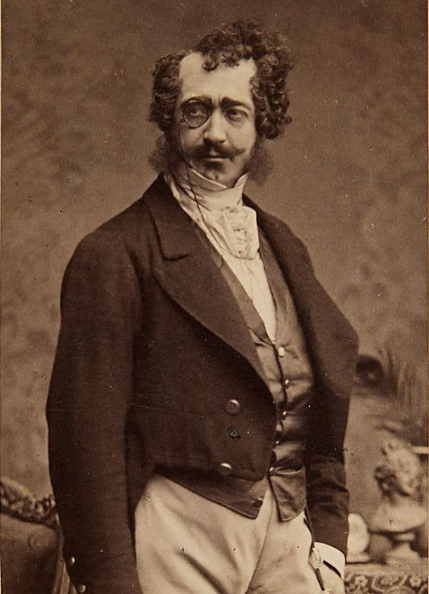
Felix Schweighofer in a full costume. (Photo; Rudolf Krziwanek / Theatermuseum Wien)
And, of course, Miss Meyerhoff is praised for her singing as well, particularly her couplet “Ja, so sind wir!”
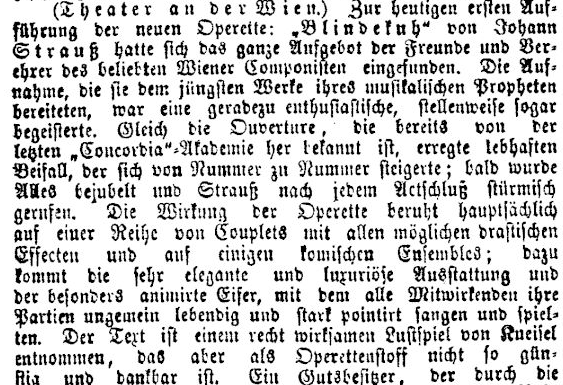
The review of “Blindekuh” in “Die Presse,” 19 December 1878.
Who killed the cousin from America?
The story about the young girl’s real-life boyfriend Hellmuth, who poses as the rich cousin from America and later bumps into the real cousin arriving with his wife, is a farce. With typical farce characters who need to be, above all, funny. And who must possess comic timing and character. Especially since Strauss wrote a whole string of elaborate ensembles which capture mad-cap situations. For example there’s a trio in which the heroine’s uptight lady-in-waiting suspects a robbery-cum-murder (“Raubmord”) which she discusses with the police officer who fears the same – and suspects Hellmuth as a fake cousin to have killed the real one.
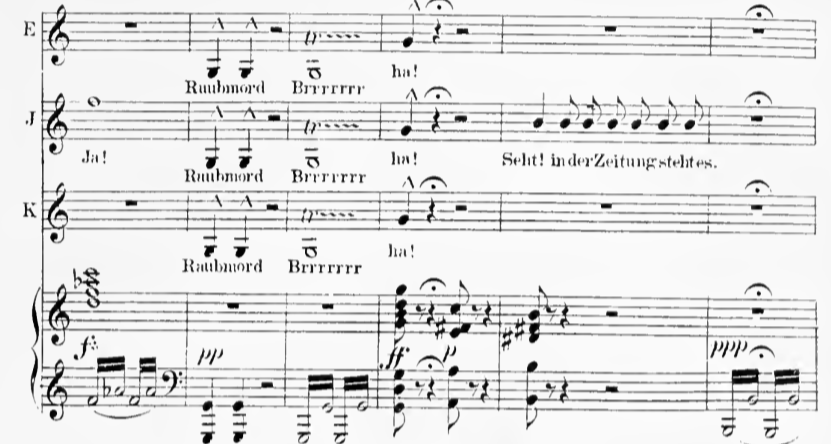
The “Raubmord” trio from “Blindekuh” by Johann Strauss.
What Strauss writes here, musically, demands drastic vocal effects. And the same is true almost everywhere else: be it chirping like swallows or falsetto yodeling-of-joy.
On the other hand, the couplets often have up to nine verses, e.g. Hellmuth’s description of modern life in the USA. To make that interesting there needs to be a lot of vocal acting and playing with the text (“So lebt sich’s dort so, so, la la, / Bei uns drüb’n da, in Amerika / It’s very beautiful, la, la / This living in America”).
For this world premiere recording on Naxos conductor Dario Salvi has prepared the performance material and flew to Bulgaria with it to record it in 2019. Mr. Salvi has restored other operetta scores in the past, such as Genée’s Seekadett or Suppé’s Afrikareise, and obviously such dedication to the genre is something that I highly admire.
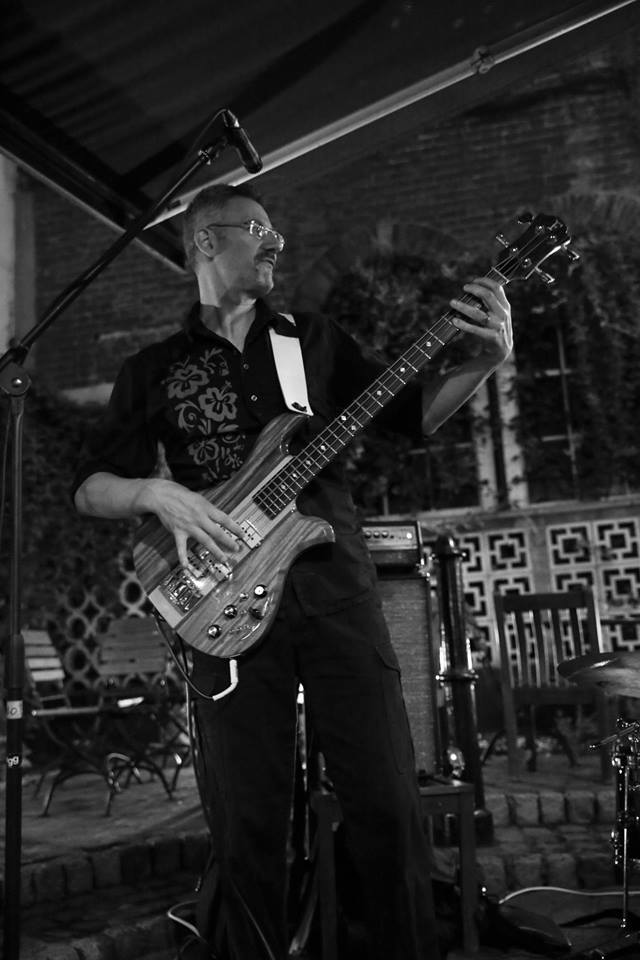
Operetta researcher dario Salvi exploring the ‘other’ side of the genre. (Photo: Private)
Also, Mr. Savi presents himself on Social Media as a very cool rock’n’roll dude, e-guitar in hand and daredevil goatee to match. Why he had to present himself in front of a Luciano Pavarotti oil painting atop a fireplace in the new Naxos booklet is beyond me. Is it supposed to suggest an operatic seriousness that is not called for in the context of this Strauss operetta?
Young singers with attractive voices
You might ask the same about the entire cast of singers. They are all mostly young, some have attractive voices (such as Roman Pichler as Hellmuth) or a lightness of touch (such as Andrea Chudak as Betsy, the real cousin’s wife, or Julian Rohde as Johann). But no one ever gets beyond singing notes-on-paper, no one ever plays with the words for “drastic effects,” and no one seems particularly “animated” or applies a “sharply pointed” style.
Which, for me, makes the glorious music fall flat on its face almost from the opening chorus onwards. It doesn’t help that some singers seem to not know the German language, actually you need to download the libretto to understand even a single word of what anyone is singing in these three acts. And some singers make rather unpleasant sounds, I’m sorry to say. (I’ll refrain from mentioning the names here because I feel terrible saying this about young artists striving to make a living in this field.)
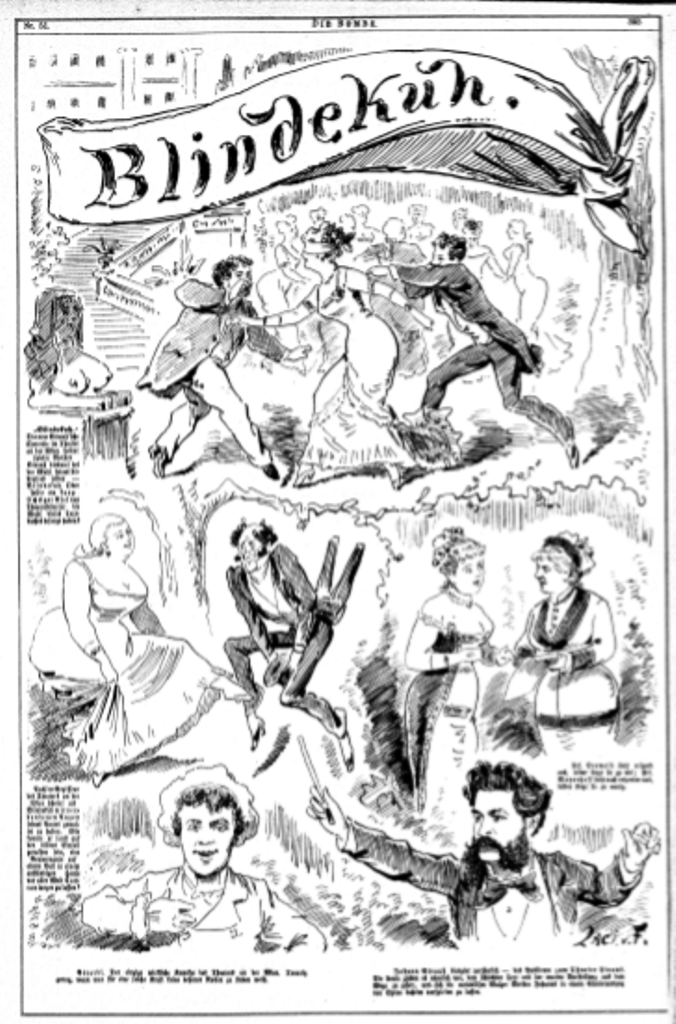
A cartoon from the Viennese newspaper “Die Bombe” from December 1878, showing scenes from “Blindekuh” and lamenting that the “extra charming looking Hermine Meyerhoff has so little to sing.”
Obviously, your reaction to this new recording depends on your basic believes: do you want your Strauss operettas sung by “legitimate voices” even if they are not particularly glorious (we’re not talking Gitta Álpár, Elisabeth Schwarzkopf or Rudolf Schock here)? Or would you rather hear music hall, vaudeville or musical comedy people in such a farce? Mr. Salvi told me musical comedy people wouldn’t be able to cope with the demands of the score. I’d say they don’t have to. Because a faithul execution of the vocal lines will not lift this forgotten Strauss operetta off the page and back into the repertoire. (In 1878 no one mentions Miss Meyerhoff’s coloraturas while raving about her portrayal of Waldine.)
“Blindekuh, muh, muh”
On the plus side, you get a pretty good idea of what the show’s potential is here. And I, at least, want to hear these glorious couplets and ensembles again and again, because they are truly inspired, all of them. With many memorable tunes lavished upon them. The most famous being the title waltz “Blindekuh” later recycled by Benatzky/Charell for the “Nun’s Chorus” in Casanova (1928). Instead of nuns praying to Virgin Mary you have young girls making cow noises here (“Blindekuh, muh, muh”) which is one of the best jokes of the entire show.
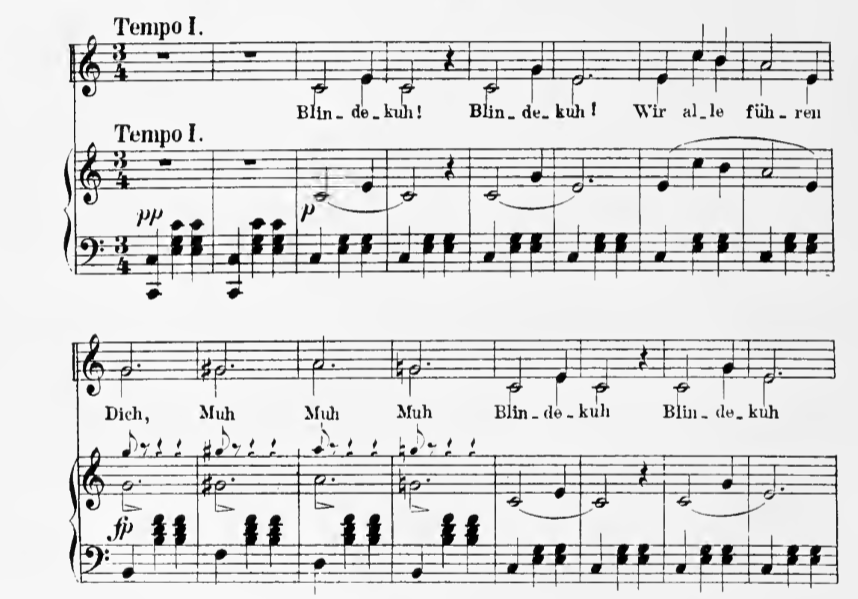
The title waltz from “Blindekuh” by Johann Strauss.
As part of the Corona virus shutdown the Sofia orchestra streamed their filmed live concert, which is the basis for this recording, last week-end as a one-off treat on Facebook. It documented Mr. Salvi’s highly energetic conducting which comes across well on CD. (Even though the sound engineers fucked up the overture which is only half as loud as the following first chorus number.) Also, in the live stream you could hear that the acoustics in the Sofia concert hall are very favorable for the singers. Which makes it even more regrettable that Naxos did not chose a different type of cast for such a one-off CD project for which other vocal qualities are necessary than in a regular theater production without microphones. (And it’s a pity Mr. Salvi and Naxos didn’t hire an expert such as Adam Benzwi to perpare the performance with the singers, an expert who has proven, many times over, that he’s able to find highly personal interpretations with singer, even opera singers, based on a detailed understanding of the text.)
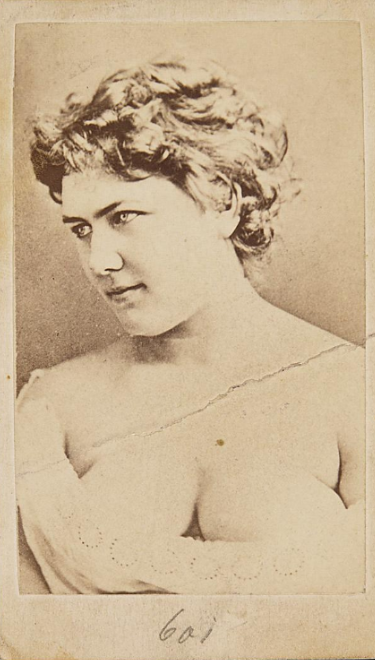
Another highly revealing portrait of Hermine Meyerhoff from the 1870s. (Photo: Theatermuseum Wien)
Where’s Kristin Chenoweth when you need her?
I know Mr. Salvi will not agree with me on this, and maybe you won’t either. In which case we’ll have to agree to disagree. It doesn’t lessen my admiration with Dario Salvi’s work, but it doesn’t make me want to listen to this recording on constant repeat either. I’d rather wait until a modern-day Hermine Meyerhoff or Alexander Girardi comes along and make these numbers fly with dramatic contrast. Where’s a German speaking Kristin Chenoweth when you need her, or someone like Johanna Spantzel, for a number like the one in act 1 where heroine Waldine sings her lilting 6/8-time appraisal of nature and her lady-in-waiting ruins it by constantly explaining each plant and animal with Latin names: it’s a crazy razzle-dazzle number in parlando style, but it needs a willingness to play with the lyrics by Rudolf Kneisel.
Talking of Kneisel: In the Naxos booklet and also in various reviews from 1878 there’s mention of the glorious Strauss music and the mediocre libretto, based on Kneisel’s successful earlier comedy. Surely, the answer to such a mediocre text book shouldn’t be that you have everyone sing so that not a word can be understood! If you just want the attractive music, then go to Strauss’ own orchestral versions of the top hits numbers.
I personally didn’t find the lyrics – as printed in the piano score and as made available by Naxos as a download, with English translation – bad at all. On the contrary, some of them are very witty and effective. To mention just two examples: the song about the gentlemen from American bringing new “games” to Europe that might be “amerikanisch”, “sogar indianisch,” and even “satanisch.” (Miss Meyerhoff might have put more than just a finger in her mouth for this.)
And when Betsy describes her honeymoon on a ship to America that is caught in a storm, leading to her and her husband having an upset stomach instead of any romantic closeness, that’s an opportunity for more “interpretation” than you hear on Naxos, especially when Strauss actually composes the storm as well as the frustrated sighing, as sharp contrast.
Luckily, this is a budget release, so everyone should grab a copy and listen even if you do it just once. It’s a forgotten show worth knowing. And it’s obvious fun with great stage potential. The performance material is ready and waiting.
For a very different reaction to this recording read Yonel Buldrini’s article here.

I ordered my copy of Blindekuh. I found it entertaining. The conducting of Dario Salvi did a fine job in bringing this rare Strauss operetta to life. It was lively and spirited. It is only me but I do enjoy some dialogue because it gives a feeling of completeness. I am happy they made this recording. Can’t wait for the future releases and recording of Waldmeister, Indigo and maybe Ritter Pazman. Fans of Johann Strauss II will be pleased with this CD.
A “spot on” review, Kevin, as always totally fair. My thoughts exactly!